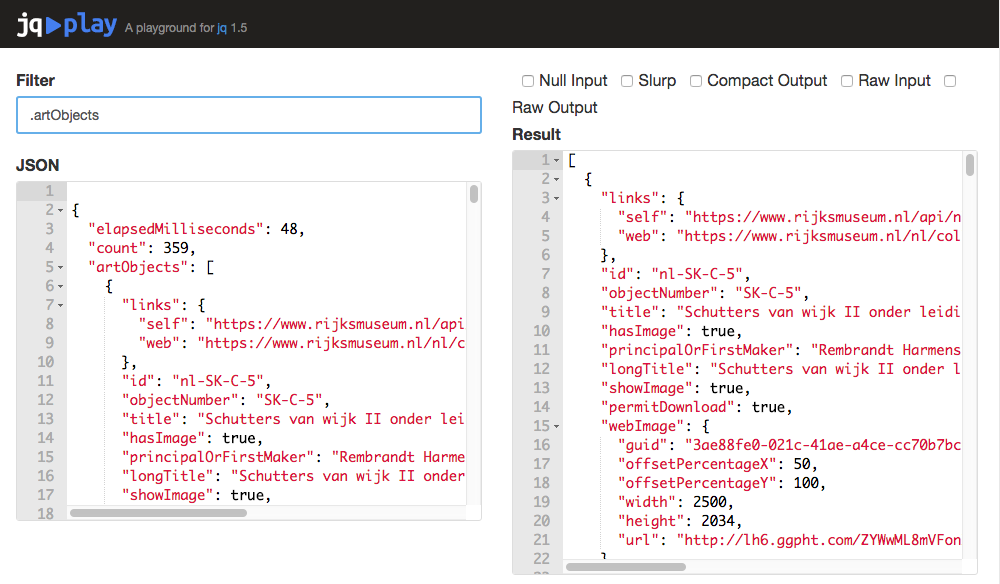

- Ruby json compare how to#
- Ruby json compare install#
- Ruby json compare generator#
- Ruby json compare software#
- Ruby json compare code#
The script tools/server.rb contains a small example if you want to test, how receiving a JSON object from a webrick server in your browser with the javasript prototype library ( works. There are also the methods Kernel#j for unparse, and Kernel#jj for pretty_unparse output to the console, that work analogous to Core Ruby's p and the pp library's pp methods. To create a JSON text from a ruby data structure, you can call JSON.generate (or JSON.unparse) like that: json = JSON. Beware, that this will disable the checking for circular Ruby data structures, which may cause JSON to go into an infinite loop. To achieve the fastest JSON text output, you can use the fast_generate/fast_unparse methods. Here a comparison of the different speedups with the Rails measurement as the divisor:
Ruby json compare generator#
The rails framework includes a generator as well, also it seems to be rather slow: I measured only 23.87 calls/second which is slower than any of my pure generator results. This generates a few more values, because there are different modes, that also influence the achieved speed: I have benchmarked the JSON-Generator as well. 17.5 times the speed of the pure Ruby implementation. I have created some benchmark results (see the benchmarks subdir of the package) for the JSON-Parser to estimate the speed up in the C extension: JSON::Pure::Parser To get the best compatibility to rails' JSON implementation, you can require ' json/add/rails 'īoth of the additions attempt to require 'json' (like above) first, if it has not been required yet.
Ruby json compare how to#
To find out how to add JSON support to other or your own classes, read the Examples section below.

g., serialise/deserialise Ruby ranges: JSON JSON ( 1. You can choose to load a set of common additions to ruby core's objects if you require ' json/add/core 'Īfter requiring this you can, e.

If you have installed the extension variant, you can pick either the extension variant or the pure variant by typing require ' json/ext ' To load the installed variant (either the extension 'json' or the pure variant 'json_pure'). Online Documentation should be located at The latest version of this library can be downloaded at
Ruby json compare software#
This software is distributed under the same license as Ruby itself, see Download To encode raw binary strings, that aren't UTF-8 encoded, please use the to_json_raw_object method of String (which produces an object, that contains a byte array) and decode the result on the receiving endpoint. On the negative side this may lead to a bit longer strings than necessarry.Īll strings, that are to be encoded as JSON strings, should be UTF-8 byte sequences on the Ruby side. This means that generated JSON text is encoded as UTF-8 (because ASCII is a subset of UTF-8) and at the same time avoids decoding problems for receiving endpoints, that don't expect UTF-8 encoded texts.
Ruby json compare code#
The quite a bit faster C extension variant, which is in parts implemented in C and comes with its own unicode conversion functions and a parser generated by the ragel state machine compiler ( Both variants of the JSON generator escape all non-ASCII an control characters with uXXXX escape sequences, and support UTF-16 surrogate pairs in order to be able to generate the whole range of unicode code points. Parsed_json = ActiveSupport::code(response.This is a implementation of the JSON specification according to RFC 4627 ( Starting from version 1.0.0 on there will be two variants available:Ī pure ruby variant, that relies on the iconv and the stringscan extensions, which are both part of the ruby standard library. Once you have installed and required JSON, you can parse it using the following: Once you have installed the Ruby gem library, you can use JSON using the following command:
Ruby json compare install#
You can install the Ruby gem library with the following command: We have provided examples of three JSON parsers for your convenience.

Once the data has been retrieved from the Public Data API, you can use a JSON parser to further consume and inspect the response. You must specify JSON in the content_type, since the Public Data API only accepts and returns JSON data. Using the RestClient POST method, you can access the API using the following code. All Ruby code should start with the following line of code: If you are using Ruby or Ruby On Rails to connect to the BLS Public Data API, you can use the rest-client ruby gem.


 0 kommentar(er)
0 kommentar(er)
